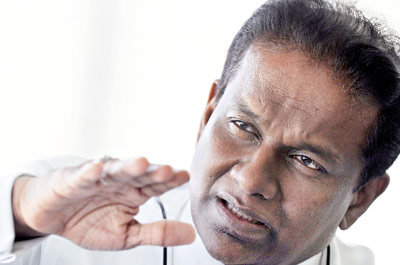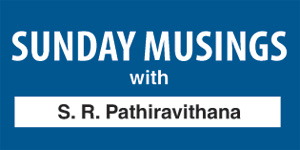Professionalism into cricket: Thilanga outlines vision
Deprivation sometimes could transform into gallantry. It was a make-or-break affair for Thilanga Sumathipala, a man who was turned into a doormat of ‘interimism’ (a word that we coined under the given circumstances) for more than a decade through constant shutting down of the elected power base through the installation of interim committees.

Thilanga Sumathipala
The newly elected Sri Lanka Cricket (SLC) President, Sumathipala, has gone through the mill of cricket governance seeing the yo-yo effects of these experiences.
Yet, he lived with his passion for cricket through all those years and now finally he is sitting in the office by the SSC grounds with that magnificent view and will be holding the magic wand of cricket power presumably for the next two years.
Last week the Sunday Times Musings had an exclusive chat with Sumathipala and he outlined his future vision for Sri Lanka Cricket and other matters pertaining to the wellbeing of the game.
First we asked the new president how he sees the challenges before him – a cricket team which is hobbling in the international arena, along with matters which are relevant to cricket governance.
Sumathipala explained: “I think our first priority is the national team. We feel at present the national team is in disarray. Taking the whole gamut of Test cricket, ODI and T-20 cricket, we feel we have fairly a big issue at hand. On the other hand, we have a problem with the national coach.
When we look at a dedicated professional team, his responsibility is not only coaching. He is in-charge of the entire support service, training schedules, warm-up matches, setting up captain’s meetings.
The coach has to be very methodical, experienced as well as a technically sound person. I do not know whether we have given enough emphasis to the issue of a national coach for more than a year now.
“We are looking at a good international coach; we cannot find a good available coach during the next few months. All good coaches are engaged right now, we are left with only few options available right now and they too will not be available right now.
So we are looking for a coach to work on a short term basis and if that works well, maybe we would recruit him on a long-term basis. This is only one side of the story”.
Sumathipala believes that the sustainability of talent is very important, especially in view of the hopes and aspirations of twenty million cricket-loving people. He said: “We have to get our focus back on cricket.
We find that they (cricketers) are entangled in various other activities. I found it very sad to see the situation of cricket at this state.”
Then the Lankan cricket boss moved to the cricket finances. “Our national cricket is not doing well, and at the same time we have a deficit of Rs. 600 million for this year – we have no money.

There is some unplanned development that is taking place. For instance, we have agreed to construct three practice indoor wicket facilities at a cost of Rs. 245 million. We cannot afford to spend that kind of money right now as financially we are in big trouble.
National development plan – there is nothing of that nature in the horizon. At the same time, we have to rewind and revisit the domestic cricket structure.
“Looking at the cricket administration we cannot see a professional organisation. We would have to employ some top administrators, top marketing people, people who can take the responsibility. We have an organisation that has a billion-rupee turnover; so we need a team of professionals to run it.
“International cricket is down, development is done haphazardly…. What is going right at the moment? I cannot see anything that is working right at this moment!”
He said the only solace is that Sri Lanka is blessed with extremely talented cricketers. That is the only plus point that is going right for the cricket at the moment, he said.
“I have to revive the entire gamut of cricket; I think I have got the mandate to do that. I want to spend one hundred per cent of my time for this endeavour.
I am not a man who complains; what I have said is the answer to your question, but, people must understand how deep our problem is; if not it is very foolish to run without knowing as to where we are heading. However if we slide our structure a bit lower, redemption would be almost impossible.”
But the new man at the helm was optimistic. He said they are very fortunate that they are still in a stage where redemption is possible. “We still could transform this side to be a champion side.”
Then the Sunday Times turned its attention to the proposed constitutional changes in cricket and wanted to know how he saw it.
Sumathipala pointed out that before they could think of a change in the cricket constitution, they must change the Sports Law of this country. “We can only change the constitution of cricket in line with the Sports Law.
We were thinking of incorporating Sri Lanka Cricket in line with an International Company – as a separate unit. If we had done that, ten years ago we would have saved more than a billion rupees for cricket – we could have saved a lot money by way investments.
It is a dollar account which would be under the companies act so that there would not be any chances of malpractice, because there is a strict process to follow.
“We could go with international remittances, and set up the SLC Incorporated. We will have to talk to the minister of finance as well as the minister of sports.
Because Sri Lanka Cricket will have a fifteen million dollar income that is more than seven billion rupees during the next four years.
We would be eligible for a tax rebate too. The players could be paid in dollars with tax benefits because they are expatriates, at the same the same time we could absorb the rest of the income into our infrastructure. We would have to retain an audit firm or a professional arm to advise us on that.
Then the Sunday Times asked Sumathipala how the SLC could make all these ambitious changes when former Sri Lanka cricket captain and the defeated vice presidential candidate Arjuna Ranatunga had made references to ICC with regard to his ineligibility to hold office.
Sumathipala replied: “I do not know in what capacity that he could write to the ICC. What is voice that he can make in a forum where cricket is concerned?
He is a defeated candidate who came third in the vice-presidential contest. So, he is defeated and rejected by the general mandate. From the cricket board point of view we just have to ignore him and go on with our development work.”
When asked about his impending legal wrangle with Arjuna Ranatunga, Sumathipala pointed out: “That is a personal matter between me and him and I will not mix my responsibility between the cricket board and personal matters.”
When asked about the mix in the voting pattern, Sumathipala said, “For instance SSC voted for me for the presidency and voted for Arjuna for the vice president’s post, because they did not want to vote for Nishantha Ranatunga.
However they wanted the Nishantha Ranatunga camp’s treasurer. Then at the CCC, the entire lot put their weight behind me, so did most of the other major cricket clubs.
Though a lot of clubs voted for Arjuna Ranatunga as vice president, most of the district votes went for the other two vice presidential candidates.
“Most of the government institutes voted for Arjuna Ranatunga, but did not vote for Nishantha Ranatunga. For instance, Polonnaruwa voted for Arjuna Ranatunga.
I could not win that seat and that is my President’s district. At the same time, Kurunegala Sports Club voted against me. That was my Sports Minister’s parliamentary seat.
Though Kurunegala Sports Club voted against me, the Kurunegala District voted for me. A cross section of the country is eligible to vote and it’s not confined to a particular segment. However, the crux of the matter is, one has to accept the stakeholders’ mandate.
“I came after ten years. I did not know what took place in cricket during the past ten years. Nishantha Ranatunga had the advantage of spending more than 800 million rupees among the clubs.
He was there for seven years – hands on with the membership. He knew what was going on and the clubs were very close to him. But, my team worked hard and it was a well-organised campaign.”


